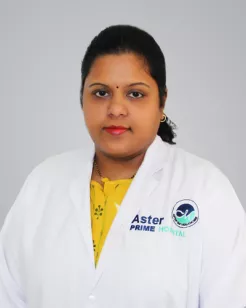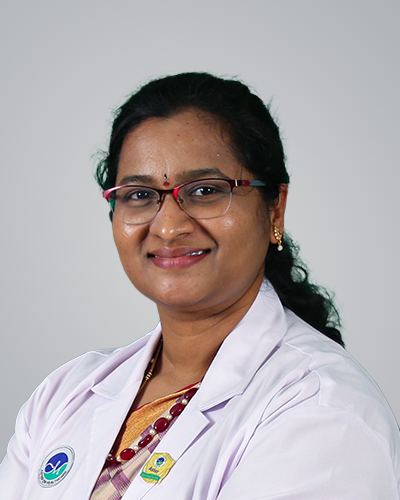'Healthy women build a healthy nation.'
The Department of Obstetrics and Gynaecology offers comprehensive services for the reproductive health and gynaecological needs of women. The Department of Obstetrics and Gynecology is an integral unit of Aster Prime hospital and is renowned for treating conditions related to urogynecology, conception, pregnancy, and infertility.
The dedicated obstetrics and gynaecology team consists of obstetricians, gynaecologists, infertility management specialists, fetal medicine experts, gynaecological imaging experts who are supported by skilled nurses, and childbirth and lactation counsellors. Our team is proficient in managing high-risk pregnancies, menstrual disorders, menopause complications, female infertility, gynaecological infections, and gynaecological cancers. Advanced surgical techniques such as Leforts and Fothergill's approach for the management of uterine prolapse are also performed in our department.
Our department has an outpatient and an inpatient division, well-equipped labour rooms, and maternity wards, a daycare wing, and a 24/7 availability of healthcare professionals who are capable of handling all possible obstetric and gynaecological emergencies.
Our Doctors
We have some of the best specialists from around the world, they bring years of experience and offer evidence-based treatment to ensure the best care for you.
Advanced Technology & Facilities
Well equipped with the latest medical equipment, modern technology & infrastructure, Aster Hospital is one of the best hospitals in India.
- Ultrasonography
- Chorionic villi sampling
- Amniocentesis
- Maternal marker screening
- Fetal assessment
- Fetal biophysical profile
- Fetal heart rate
- Pap screening
- Hormonal assays
- Colposcopy
- Hysteroscopy.
FAQs
Want to find out more about the treatment? The answer to your questions can be found below.
Are Obstetricians and Gynaecologists same?
No
What conditions do Obstetrics and Gynaecologists treat?
Obstetricians manage:
- Pregnancy and prenatal care
- Labor and childbirth
- Postpartum care
- High-risk pregnancies
- Miscarriages
Gynecologists treat:
- Menstrual problems (e.g., heavy periods, pain)
- Reproductive health issues (e.g., endometriosis, fibroids)
- Fertility problems, Menopause management,
- Sexually transmitted infections (STIs),
- Gynecologic cancers (e.g., ovarian, cervical, uterine).
What are the early signs of Pregnancy?
Common early signs of pregnancy include:
- Missed period
- Nausea or morning sickness.
- Fatigue.
- Tender or swollen breasts.
- Increased urinationLight spotting (implantation bleeding)
- Food cravings or aversions.
- Mood swings.
What are Obstetrics and Gynaecology?
Obstetrics: The branch of medicine that deals with pregnancy, childbirth, and the care of women during and after childbirth.
Gynecology: The branch of medicine that focuses on the health of the female reproductive system, including the diagnosis and treatment of disorders and diseases related to the uterus, ovaries, fallopian tubes, and breasts.
What is pre natal care visit?
A prenatal care visit is a medical appointment for pregnant women to monitor the health of both the mother and the developing baby. It includes physical exams, lab tests, ultrasounds, and discussions about health, nutrition, exercise, and any potential complications.
What are the precautions of 1st Trimester pregnancy?
Precautions during the first trimester include:
- Avoiding harmful substances (e.g., alcohol, smoking, certain medications).
- Eating a balanced diet with sufficient folic acid, iron, and calcium.
- Maintaining regular prenatal visits.
Blogs
The source of trustworthy health and medical information. Through this section, we provide research-based health information, and all that is happening in Aster Hospital.






